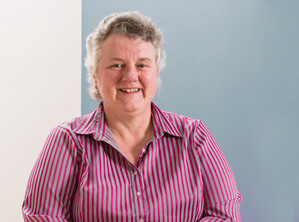
Meet Karen Reece, Head of Patient Services at NEC
Karen Reece took over responsibility for NEC’s patient services in December 2022. Her team delivers managed screening services across the UK and Ireland, including newborn hearing tests and regular eye screening for people with diabetes. Six months in, we asked Karen about her first impressions, her team, the challenges facing screening programmes and how she’s gearing up for the future.

Karen Reece
Karen Reece | LinkedIn
What was your first impression of your new role?
I’ve been at NEC since 2018, so I knew we had screening expertise on both the software and services side. Our work on newborn hearing screening, for example, goes back more than 15 years. Plus we promote the importance of screening on our intranet, like on World Diabetes Day. But what I hadn’t appreciated was how creative our team was being – every single day – to make sure people actually get screened.
What does a managed screening service entail?
Rather than just providing the software we also run the screening programmes on behalf of our customers, which are different regions of NHS England or the Health Service Executive in Ireland. We employ the screeners, manage quality assurance, arrange people’s appointments and hold clinic at the right times and places to match the needs of the local population.
How is your team set up?
I lead about 500 people across England and Ireland, some based in central ‘hub’ offices and then a big team of very mobile screeners! They travel all over the place, sometimes covering really rural areas, to reach the people that need these checks. Lots of my team have worked in hospitals or community healthcare and they really know their stuff.
Why is it so important that screening reaches everyone?
Screening catches conditions early so they can be treated or managed better. If people have diabetes, for example, they are at a greater risk of sight loss. Or if a baby’s hearing is impaired, they may struggle with communication skills because they aren’t getting the right support. That’s why screening programmes have to maximise their coverage; it’s about trying to prevent harm.
How do you stop people missing out?
Our whole team is geared up to make sure everyone who’s eligible gets contacted, that everyone’s results are tracked and communicated, and – in the case of diabetic retinopathy screening – to reduce the number of Did Not Attends (‘DNAs’ for short). Giving people a choice of appointment times and letting them book online is great for that, because people are far more likely to attend if it’s happening at a time and place that suits them. We remind people beforehand, we contact them to rebook if they couldn’t make it and, of course, we make it friendly and fuss-free. The quality of that patient experience is so important, whether you’re screening newborns, young people or adults.
What if people fall off the radar?
If people consistently don’t show, it could be for all kinds of reasons, but what’s important is that we can see it in our data. So we start by working with GPs and local health bodies to check records are up to date. We look at the demographics too. Are the people who keep missing their eye screening appointments of working age, for example, so should we add a Saturday clinic? Are there lots of people who move around on canal boats and no longer have a fixed address? In which case we’ll work with community groups and send out appointment letters by email. When people fall off the radar at any stage, we just have to innovate and find them.
Will you be changing how you work?
We’re always changing how we work! Bringing new ideas to the table and thinking about future challenges is a natural part of working at NEC. If we’ve got a process 98% right, we don’t stop there. It’s health screening, so even marginal gains have enormous value.
At the moment, we’re putting a real focus on building relationships locally, because health inequality has risen sharply since Covid-19. Many people who found it harder to access healthcare before, for example due to homelessness, have now been lost to the system completely.
What’s interesting is that we’re all chasing the same people. So we’ve been working with GPs and hospitals to trial ‘one-stop shops’ for diabetes care. Imagine a clinic where your consultant, your nurse, your podiatrist, your dietician, your screener are all there ready for you. The early feedback has been great; people loved it and the providers got to check up on some of their highest-risk patients.
These types of initiatives will be so important for the future too. We’ve got a growing obesity crisis which is likely to have a knock-on effect on the numbers of people with diabetes. We have to be ready for these challenges because our customers will need to be too.
NEC supports a number of universal and cohort-specific screening programmes:
Newborn babies
- Hearing screening
- Bloodspot screening
- Physical examination
Children and adults
- Diabetic retinopathy
- Abdominal aortic aneurysm (men over 65)
Find out more about our Screening Services. | Connect with Karen on LinkedIn

